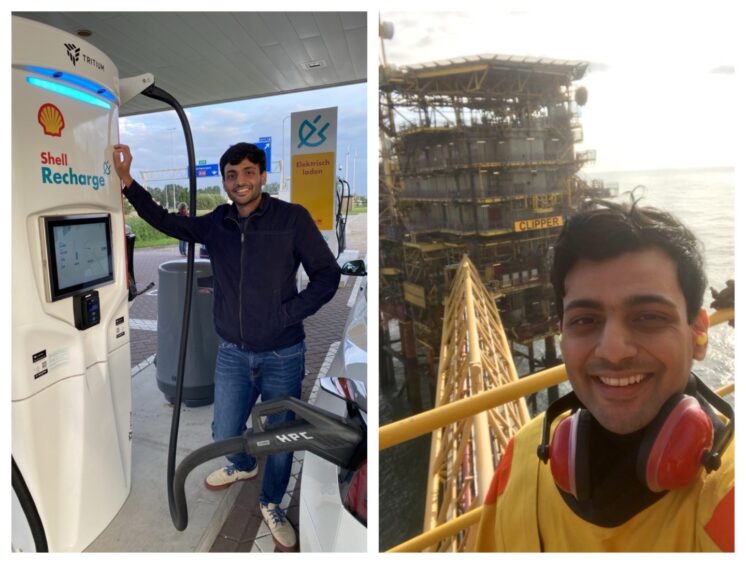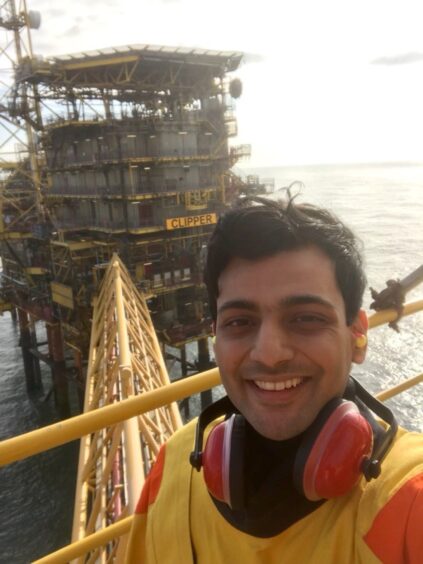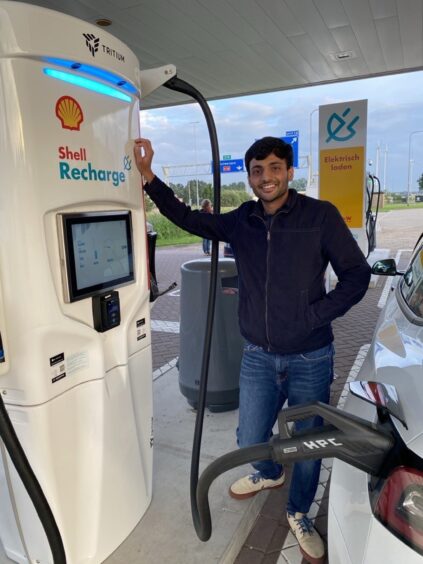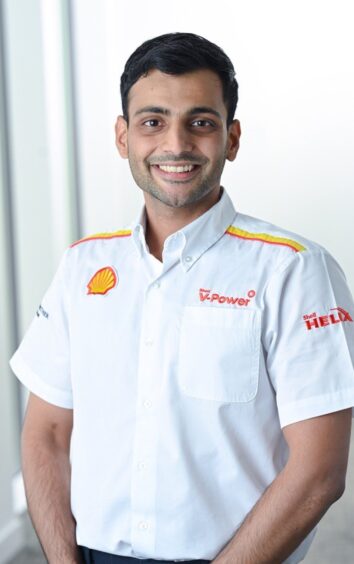
To achieve a just transition workers in traditional energy sectors such as oil and gas must see a pathway to greener employment.
Venkatesh Shreedharan, engineering manager for Shell’s electric vehicle (EV) arm, and Claire Tindle, energy offtake manager at Flotation Energy, are two such people who made the jump to lower carbon industries.
Claire Tindle (CT) worked with an oil and gas operator for a time before joining Flotation Energy to assist with providing a link between the firm’s Green Volt project and the North Sea operators using it.
Venkatesh Shreedharan (VS) joined Shell as an intern in 2014 and enrolled in the supermajor’s graduate program in 2016 where he worked on the Solepit Clipper & Leman Alpha gas platforms.
Now Shreedharan works for Mobility UK as an engineering manager, “overseeing the installation and maintenance of mobility assets,” including EV charging points.
Energy Voice asked the two how they found moving from the world of hydrocarbons to lower carbon sectors.
How did you make your career transition from oil and gas to renewables? Can you reflect on how easy or difficult you found it?
VS: “Although I had graduated with a masters in sustainable energy from TU Delft, I was not averse to working in traditional areas of the energy sector. I still think that the pathway to a net-zero future involves oil and gas – and gas in particular. We cannot jump straight from them into exclusively using renewables due to the time and cost needed to develop our energy infrastructure to suit renewable energy systems.
“I was exposed to a wide variety of technical systems whilst working offshore, ranging from simple electrical systems to complex gas turbines. More importantly, I learned the importance of being practical and pragmatic when it came to solving problems. This was a refreshing change from my university classroom where most of the solutions were realisable only on paper!
“Fast forward to 2020, I wanted to utilise my education and practical know-how to make an impact on the energy transition. An engineering role within the bustling EV charging sector was an ideal transition because I could leverage my technical skills in a commercially focused business. I had to consciously put our customers first while assessing various technical options to build our sites – be it EV charging for cars or LNG refuelling for trucks.”
CT: “I’m quite entrepreneurial, so when the company I was working for sold their UK business I took the opportunity to see if there were any renewable job opportunities. I didn’t do this through a drive to leave oil and gas, but rather to see if I could use my skill sets to have an impact on the global challenge to decarbonise.
“In my previous role at an oil and gas operator, I had contacted Flotation Energy to investigate the feasibility of using offshore wind turbines to decarbonise an oil and gas platform as an alternative to purchasing new gas turbines. Timeline considerations for that asset meant that this was not a feasible option.
“When I contacted Flotation Energy a couple of years later, it had just made an INTOG application with its joint venture partner Vargronn to build floating wind farms to provide electricity direct to oil and gas offshore installations. When it became clear that the team’s applications were successful, Flotation Energy contacted me to see if I could provide a link between the Green Volt project and the oil and gas companies.
“Although I’ve had a lot to learn about the technical, economic and legislative aspects of offshore wind generation, I found the transition fun and relatively easy – and I am still learning! I had luck with timing, but I’d also laid the groundwork with my previous interest in the topic.”
How do you assess the level of opportunity for those in your field to do so? Similarly, where do you see the challenges or barriers as they stand presently?
VS: “The opportunity for individuals working in traditional oil and gas to move over to renewables is certainly there and it is only gathering pace as we go further along in our journey towards net zero.
“For instance, Shell Mobility had far fewer people working on EV charging when I joined the team in 2020. Fast forward to today, there are hundreds of my colleagues spread globally accelerating our EV infrastructure program. This EV journey requires strong electrical engineering and project management skills that employees in the traditional oil and gas sector often excel at.
“One of the biggest challenges is lack of awareness among those working in oil and gas about making the move. I have worked with a talented bunch of offshore technicians and there is a massive opportunity to tap into their skills to drive the energy transition. There is always an onus on the employee to upskill and seek new opportunities. However, we also need more initiatives from energy companies to help upskill the workforce.
“Recently, Shell supported Greenworkx on a landmark report that highlighted the challenges around finding the right people to support the electrification of the transport sector in the UK. We also supported City & Guilds in preparing quality training materials for people wishing to enter the EV charging industry.”
CT: “My current role leans more heavily on general transferable business skills built up through my career in oil and gas and I believe there will be many future opportunities for those in oil and gas to transition into similar business roles as the renewables industry develops.
“Creative and analytical thinking, grounded in rigour and pragmatism, together with project management skills and experience in dealing with uncertainty are required to create the business cases for these nascent industries. These are skills intrinsic to oil and gas.
Having stepped out of the oil and gas industry, I better recognise the extraordinarily strong skill base that exists in that industry.
“When I started my transition job search, I had expected to find opportunities better aligned with my technical subsurface background as a geophysicist.
“However, there were few opportunities in this area and I expect transition roles in a subsurface domain to remain challenging until a commercial model for carbon capture is developed. At that point, there will be a huge need for direct transfer of subsurface, drilling and completions and facilities engineering skill sets.”
Do you see clear integration between the oil and gas and renewables sectors in the UK? Are there any “us and them” cultural issues?
VS: “I do observe the cultural differences at my workplace when I reflect on my graduate days on an offshore platform and my current role deploying EV charging. The perception of energy transition and the reality of global warming has truly undergone rapid change in the last few years.
“The oil and gas industry clearly sees the need to collaborate and support the energy transition. As an example, Shell operates hundreds of miles of pipelines carrying oil and natural gas across the North Sea.
“We have been assessing the potential use of these pipelines to transport CO2 for sequestration and storage in our depleted reservoirs.
“Similarly, within mobility, we work with our EV charger suppliers to deploy battery energy management systems that allow our chargers to optimally use the grid power.”
CT: “I have noticed some ‘them and us’ cultural issues, but not at a personal level. Generally, any comments I’ve overheard follow media narratives and I believe are driven by a lack of understanding of how the two industries can be aligned.
“On a one-to-one basis, I have not noticed any interference in personal relationships between those of oil and gas and renewables sector backgrounds. On the contrary, one senior manager noted that he had been surprised by the notable high energy and drive as well as the skills that oil and gas employees bring to the workplace.”
How do you feel about the attractiveness of the industry to the next generation? Is oil and gas seen as a valid part of the energy transition?
VS: “During my intern days at Shell, one of our general managers said one of the biggest opportunities to make an impact on the energy transition is from within the oil and gas industry rather than the outside. If we can continue to reduce our scope 1 and 2 emissions whilst also selling low-carbon products to our customers, that is a win-win for everyone.
“Recently, Shell won the title for Most Popular Graduate Recruiter in Energy & Utilities in a national graduate recruitment event. This shows that many in the next generation feel that oil and gas (and more importantly Shell) will continue to play a pivotal role in the energy transition.”
CT: “I expect oil and gas to remain a strong industry for the next generation. Whilst there remains an aspiration for renewables to replace the need for oil and gas, the reality is that global oil and gas production is at a record level and there’s an expectation that the global demand will remain strong in the near future. There is no simple switch to change global infrastructure from using oil and gas one day to renewables the next.
“Many of the next generation of UK workers do not consider the oil and gas industry as an attractive or secure place to work. I’m hopeful that over the coming years, a different narrative and understanding will emerge, of the opportunity to have a real impact on one of the greatest challenges of our time – how to decarbonise oil and gas and reduce our resilience on the products derived from it.
“The next generation can have an incredibly rewarding career, helping to drive reduced carbon emissions for a product which will remain a global commodity for many years to come.
“Over the last few years, the UK oil and gas industry has made reducing carbon emissions a priority and has demonstrated how changes in work practices can have a significant impact.
“This is also why I am keen to be working with Flotation Energy on the INTOG projects, to be part of finding a solution to decarbonise oil and gas production and identify a solution template which can be exported globally.”
“The oil and gas industry needs people with passion, creativity, and analytical skills to identify these opportunities and find the solution. There remains a huge opportunity to make an impact globally whilst the world transitions away from being dependent on oil and gas.”
The International Energy Agency says the global oil and gas industry has less than 1% of the world’s clean energy investments. How would you respond to that and does that reflect your experience in the industry, be it UK North Sea or otherwise?
VS: “Any new technology needs to be reliable, affordable, and accessible. If one of the three aspects is missing, a superior technology eventually replaces it. If you take the example of Tesla – very few believed in the hype around EV charging before Tesla.
“They were a game changer in the EV industry and hugely accelerated electrification of the transport sector. This is also true for our energy systems and our belief within Shell.
“My team and I are working hard to make EV charging reliable, affordable, and accessible – to help build our customer’s confidence in Shell Recharge.
“There are other teams within Shell that are following the same approach across other low carbon sectors such as offshore wind, biofuels, hydrogen to name a few.
“Last year, nearly a quarter of Shell’s capital spending – 23% – was on low-carbon energy. That’s billions of dollars, making us one of the biggest investors & believers in the net zero future.”
Recommended for you

 © Supplied by Flotation Energy
© Supplied by Flotation Energy © Supplied by Shell
© Supplied by Shell © Supplied by Shell
© Supplied by Shell © Supplied by Shell
© Supplied by Shell